Cheryl Hines … as First Lady? The ‘Curb’ Star on Life After Larry and Marriage to RFK Jr.
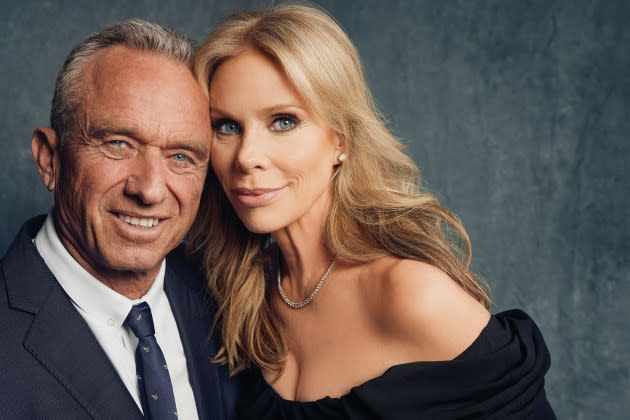
It’s Christmas at the Kennedys’, and a happy sort of chaos has upended the family home, nestled in the affluent L.A. enclave of Mandeville Canyon.
Conor, 29, the heartthrob son once romantically linked to Taylor Swift, has emerged from the backyard sauna and is wandering around the house in a towel. His striking sister, Kyra, 28 — a fashionista and “Page Six”regular back in her party days — is fussing over their father, Robert F. Kennedy Jr., 69, in preparation for today’s photo shoot.
More from The Hollywood Reporter
'Game of Thrones' Creators' Wild Road to Their Biggest Gamble Yet: Netflix's '3 Body Problem'
Oprah and 'The Color Purple' Stars on the New Musical Remake: "It's Bright. It's Vibrant. It's Us"
Amid this flurry of activity, affecting an air of regal calm as best as she can, stands Cheryl Hines. Hines, 58, has been Kennedy’s wife since 2014 — a second marriage for her and a third for him. Kennedy’s second wife, Mary Richardson Kennedy, mother to Conor, Kyra and two other sons — Finn, 26, and Aiden, 22 — died by suicide in 2012. Hines now oversees a blended family that also includes her own daughter, Catherine Young, 19.
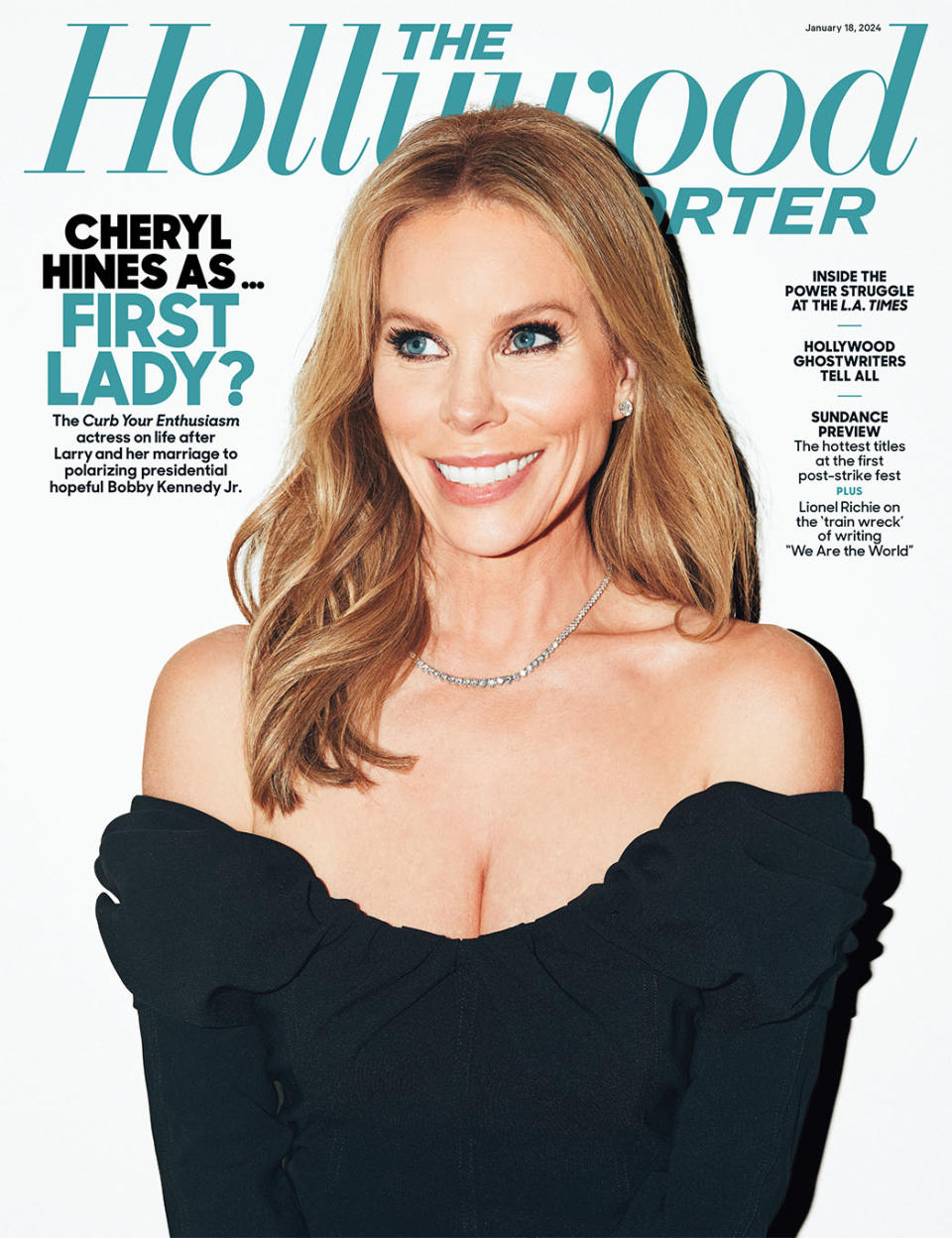
Not 24 hours earlier, Kennedy — who is running as an independent for president (and polling higher than expected, with 1 in 5 Americans saying they are open to voting for him) — was in the hot seat for a combative CNN interview that challenged his highly controversial views on vaccine safety. Right now, however, he’s debating the merits of beige versus blue dress shirts.
It was not so long ago that Hines was best known for being someone else’s wife — that of Larry David on the long-running HBO comedy Curb Your Enthusiasm. That TV marriage ended in season six, after her Curb alter ego had reached her limit with her husband’s mortifying public antics. (The final straw: She called him from what she thought was a crashing airplane, but Larry only wanted to ask her questions about the DVR.)
Hines isn’t anywhere close to that point with her real-life husband, however, despite his own penchant for mortifying public antics. All of this fringe-minded controversy spilling over into predominantly liberal and groupthink-minded Hollywood has, not surprisingly, put stresses on Hines’ social standing around town. Nonetheless, Cheryl and Bobby, as most everyone in Kennedy’s orbit calls him, remain deeply in love and are committed to heading down the road together, hand in hand, wherever it leads. Even the White House.
Just weeks after Hines made her debut appearance as a potential first lady — introducing her husband as someone who “stood for the little guy” at an Oct. 9 campaign rally in Philadelphia — David announced that the upcoming 12th season of Curb, set to debut on HBO and Max on Feb. 4, will be its last.
Hines says none of this was planned and that if she had her way, Curb would keep on going. A small part of her holds out hope that it still could. (The show took a six-year hiatus, after all, between seasons eight and nine.) “Going into production, we were told most likely it will be the last season,” she later tells me in a frank three-hour conversation. “But since season one, Larry has said, ‘This is probably the last season.’ Until I saw it in black and white — when the press release went out — I didn’t want to believe it.”
Yet here she is, leaping from one precipice — bidding adieu to the role that transformed her from a struggling bartender into a star — into something vastly scarier: playing the good wife to a presidential candidate, with all the mudslinging and safety concerns that implies.
“I’m taking more precautions than ever,” Hines says of her new elevated profile as a candidate’s wife, especially since a mentally ill intruder broke into the home. “I was here doing an Instagram Live, and I look out the window and see a guy in our backyard. Then I see our security person intercept him and reach for his weapon.” The man was found to be wearing a fake police badge and had apparently sent hundreds of emails threatening Kennedy. He since has been released from jail and the family has a restraining order against him. Despite that, no Secret Service detail has yet been assigned to Kennedy — a decision ultimately made by the secretary of Homeland Security. “You would think that instance, plus the fact that his father and uncle were both assassinated, would qualify him,” she says.
Kennedy, an admitted former womanizer and heroin addict, is a special-case candidate in more ways than one. At his first campaign announcement (back in April, when he was running as a Democrat), he told a crowded ballroom, “I told my wife the other day, I said, ‘I got so many skeletons in my closet that if they could vote, I would be king of the world.’ ” And he’s a potential election spoiler, feared and mocked for perpetuating dubious and disproven claims about everything from COVID vaccines (he falsely called them “the deadliest vaccine ever made”) to the cause of AIDS (he has said it’s amyl nitrite, or poppers) to the assassinations of his uncle, John F. Kennedy, and father, Robert F. Kennedy (he suspects the CIA).
Whatever the outcome, with roughly 300 days left until the election, the campaigning is only going to grow more intense, the scrutiny more severe. There are times in our conversation where Hines appears visibly overwhelmed at the specter of it all, like a glass of water about to overflow. In terms of those “skeletons” her husband has referred to that are soon to be exhumed, she says, “He is pretty candid about his past — and I guess the womanizing of it is a part of his past. When you have a previous president who was just on trial for rape and he’s still the frontrunner for the Republican nomination, I don’t know how important it will be.”
I note to Hines the fascination of watching this whole thing play out from a distance.
“It’s even more fascinating watching it from the hurricane’s eye,” she replies.
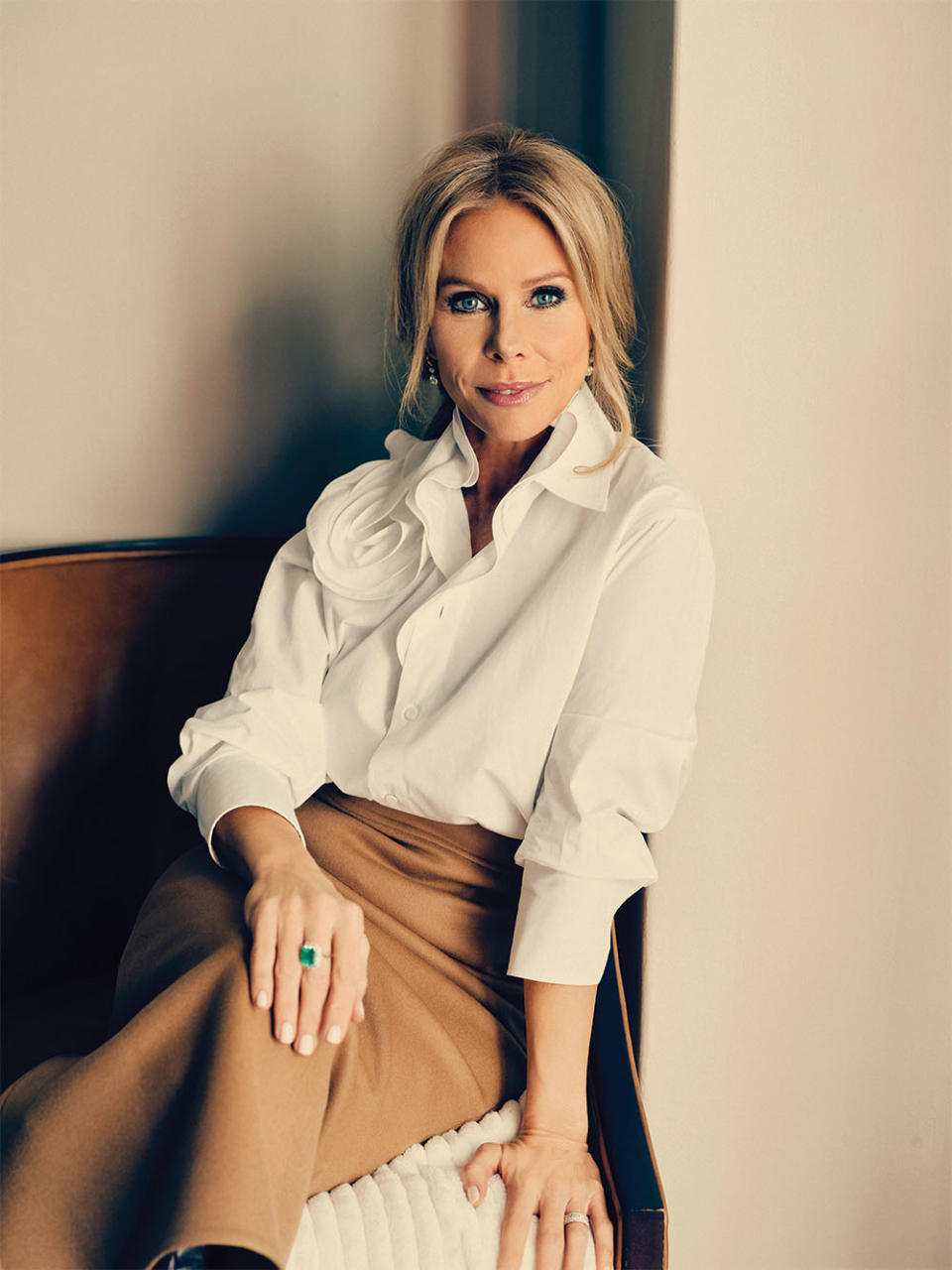
***
Hines grew up in Tallahassee, Florida, the only girlie-girl born to a family of “rough and tumble” sports and fishing nuts. The family had very little. “She was raised in a trailer,” says Kennedy. “She slept in the same bed with her mom until she left high school.”
When their parents announced they were divorcing, “we realized everything we thought was real wasn’t,” says her older sister, Becky Hines. “So the four of us kids made an unspoken pact to form our own little coalition.” The siblings eventually landed in Orlando, where in 1990 Hines found work at the newly opened Universal Studios Florida. She played Marion Crane in a Psycho show there, requiring her to wear a nude bodysuit and get stabbed to death by an audience volunteer several times a day. “I don’t know who thought of this show,” she says of her introduction to showbiz. “It was crazy.”
In 1993, Hines landed a real part — a guest-starring role on Swamp Thing, a TV series based on the DC comic. With that credit under her belt, Hines felt the time was right for her to move to L.A.: “It just felt like it was my destiny.” This being the days before cellphones, her siblings handed her a stack of supportive notes for her to read along her journey, which was made in a Toyota Tercel with 130,000 miles on the odometer. (Two of the notes hang framed on her office wall.) Hines arrived in Hollywood a few days later. The Swamp Thing episode aired not long after that. It did not have the effect she’d anticipated: “Let’s just say the telephone did not ring after my debut.”
Luckily, a friend had set her up with a bartending job at the InterContinental Hotel in downtown L.A. It was steady income and a strategic perch from which to observe the peculiarities of Hollywood culture. A director — she doesn’t want to name him, but hundreds of other #MeToo accusers have — once summoned her to his room for an audition that quickly devolved into creepy questions about personal hygiene. She escaped by arranging to have friends knock on the door at a specified time. In 1994, the O.J. Simpson trial jury was sequestered at the hotel. “From the bar, you could see in one of the windows that a juror had etched the words, ‘HELP ME,’ ” Hines recalls. “We weren’t allowed to go up to that floor.”
Along the way, she would get the occasional audition but never landed a part. That continued for about five years, during which she got a part-time job working as a personal assistant to Rob Reiner. “Then I turned 30 and thought, ‘Oh, boy, I’m 30. I’m a bartender. And I’ve done Swamp Thing.’ I really got depressed.” Becky suggested she come back to Florida and get a degree in psychology as a fallback plan. “But I couldn’t bear the idea of just giving up and going home. So I decided, ‘I guess I’m going to die alone in this rent-controlled one-bedroom apartment in West Hollywood.’ ”
One thing that kept her spirits afloat, however, was The Groundlings. Shortly after she arrived in L.A., Hines enrolled in classes at the sketch comedy theater on Melrose — a launching pad for everyone from Will Ferrell to Jennifer Coolidge — and found she had a knack for improv. Over four years, she progressed through the class ranks and made it into the Sunday Company, which serves as a farm team to the main company. There, she met comedian and actress Rachael Harris in 1995. The two remain best friends. “I was this nerdy theater kid,” Harris recalls. “And Cheryl was the hot girl — funny and hot. We would write sketches together — oh my God, we wrote some of the worst sketches. We loved to fail together.”
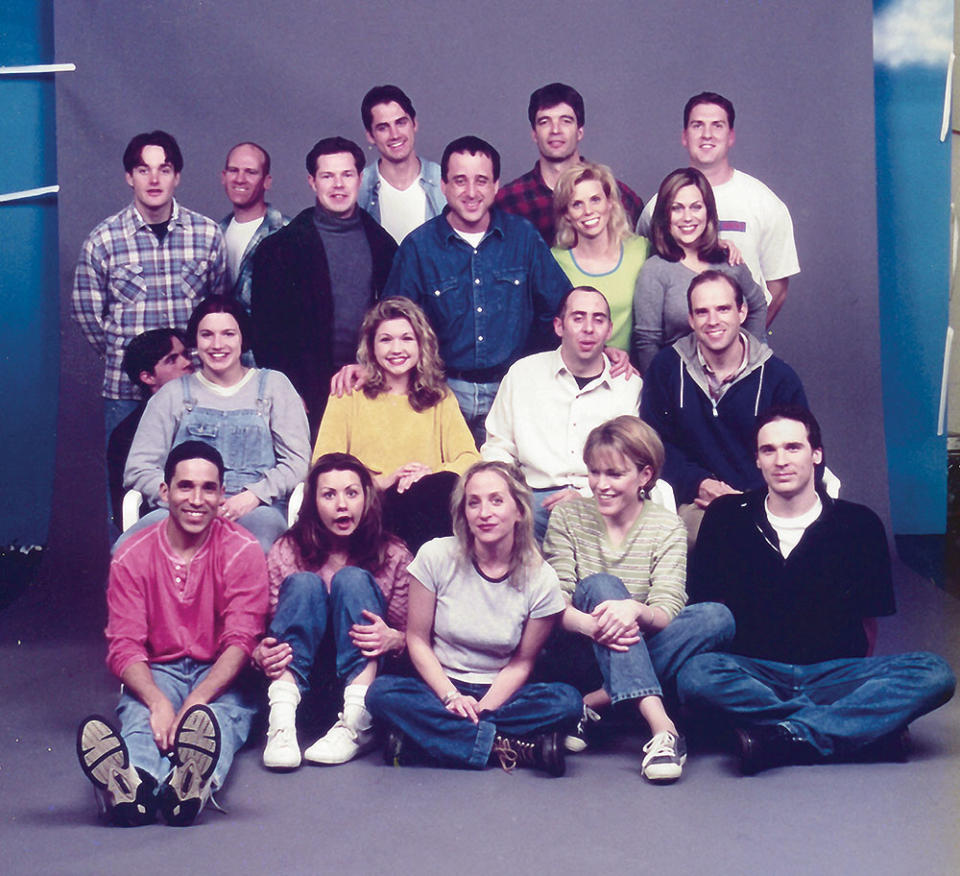
It was a sketch performed in an industry showcase that drew the attention of Curb executive producer Larry Charles. In it, Hines played an earthquake preparation expert who had virtually no expertise in the subject. “She’s like, ‘Worst case scenario, you can drink your own pee,’ ” Harris recalls. “It was just so dumb. That was the one that Larry Charles was like, ‘OK, we need to bring her in for an audition.’ ”
Says Hines of Larry David: “He really wanted to cast an unknown actress, which was great for me.” Curb was conceived as a one-off special: a satirical look at David’s personal life as he prepared to return to stand-up comedy. The audition was entirely improvised. “There was no script. Nobody told me anything about anything. They just said, ‘Go meet Larry and he’ll tell you what to do when you get in there.’ ” David introduced himself and described a scenario that leads to a marital spat. He told her not to pull punches. “And so I didn’t,” Hines says.
It probably helped that she knew very little about David beyond the fact that he had some hand in creating Seinfeld. “I think some people were so in awe of him,” recalls Julie Welch, another Groundlings alum with whom Hines remains close. “But she didn’t really know his history. I think she was kind of ballsier with him and had no problem giving him a hard time.”
For David, there was one quality to her audition that made her stand out from the others. “I loved her condescension,” he says. “She treated me like a 12-year-old idiot. And she always knew how to bring out the comedy in a scene.” So, with really only a single credit, Hines got the part. The network loved the special so much, they ordered a 10-episode season.
“I was teaching improv at the Groundlings when Larry called to tell me HBO wants to do this as a series and he wants me to play his wife,” Hines says. “And I said, ‘Oh my God. That’s the best news I’ve ever heard!’ And he said, ‘I … hope that’s not true.’ ” Twenty-five years later, what was supposed to be a one-hour special is now poised to culminate in a 120-episode run.
Filming the final episodes of Curb was among the most difficult and emotional experiences of Hines’ life. Even the show’s notoriously unsentimental star showed cracks in the veneer. “He gets quiet, I think, when he gets emotional,” Hines says of David. (Asked what kind of emotions filming his final scene with Hines elicited, David says: “None at all. Is that bad?”)
After the final shot, the cast “took a moment. And then nobody knew what to say to each other. You don’t want to say goodbye because they’re your friends,” she adds, referring to Curb co-stars like David, Susie Essman, Jeff Garlin, Richard Lewis and J.B. Smoove. “It’s sad.”
“Was there ever any kind of actual romantic spark between Larry and you?” I ask.
She smiles. “No,” she says. “It’s interesting because we’ve been together for so long, there have been times where I felt like I was married to him in another universe. I’ve always felt very close to him. But we were always dating or married to other people. So it was never that. What we have is a closeness that’s hard to describe.”
Her eyes well up. “Oh no, am I getting emotional? Let me grab a tissue,” she says, and does. “He’s been such a big part of my life for over 20 years. For me, it’s an attraction that I can’t really explain. A friend that I love to be with. He really makes me laugh. I feel like we know each other very well. He’s in his own category in my life.”
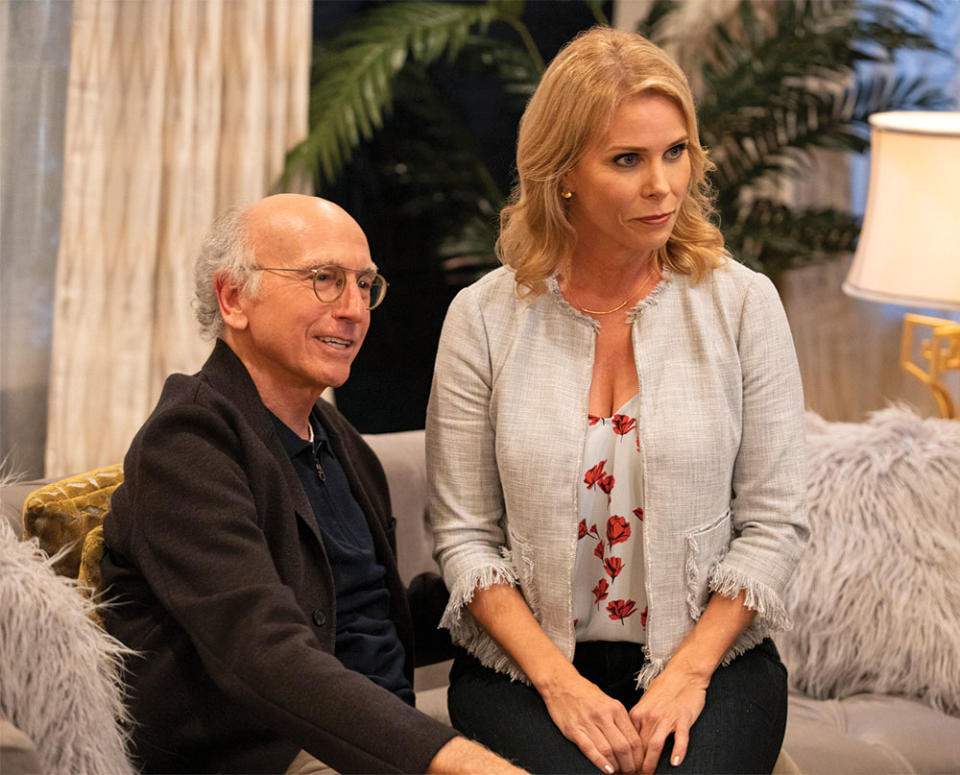
***
Hines met Kennedy in 2004 in Banff, Alberta, at a celebrity ski fundraiser for Waterkeeper Alliance, a nonprofit Kennedy founded in 1999 that grew out of his work as an environmental attorney, safeguarding the Hudson River from industrial polluters.
David, whose former wife, Laurie David, is a climate activist, knew Kennedy from environmental circles. “We traveled together and went on ski vacations together,” says Kennedy. “I stayed with [the Davids] during the summers at the Vineyard.” Kennedy even gave David ideas for Curb episodes, like season five’s “The Ski Lift,” which came from a legal case Kennedy recounted involving a couple left dangling above a ski hill.
Hines tagged along with David to the Banff event. “I remember Larry saying, ‘I’m not going to ski,’ ” she says. “And I said, ‘I’m also not going to ski. I’m from Florida. I don’t know how.’ ” They walked into the chalet and found themselves standing among a small group of celebrities, Dan Aykroyd among them. “And the next thing I know, Bobby’s putting ski boots on us, getting us skis, and then we’re on the lift.
“And Bobby said, ‘Where’s your hat?’ I said, ‘Oh, I don’t have one.’ And he took his off and gave it to me, which I thought was very sweet. I said, ‘Well, now you don’t have a hat.’ He was like, ‘I’ll be fine. Don’t worry.’ So that was my first impression of him,” she says, but notes it was not a romantic encounter, as both were married.
From there, they ran into each other about once a year. But in 2010, the playing field changed. Hines had divorced her husband, Paul Young, founding partner of Hollywood management firm Principato-Young Entertainment, to whom she had been married since 2002. (The two remain on good terms and even celebrate Thanksgiving together at the Hines-Kennedy house.) “I saw in the paper that Bobby was going through a divorce, too,” she says. “And I remember thinking, ‘Oh, that’s interesting. We’re going through the same thing.’ ”
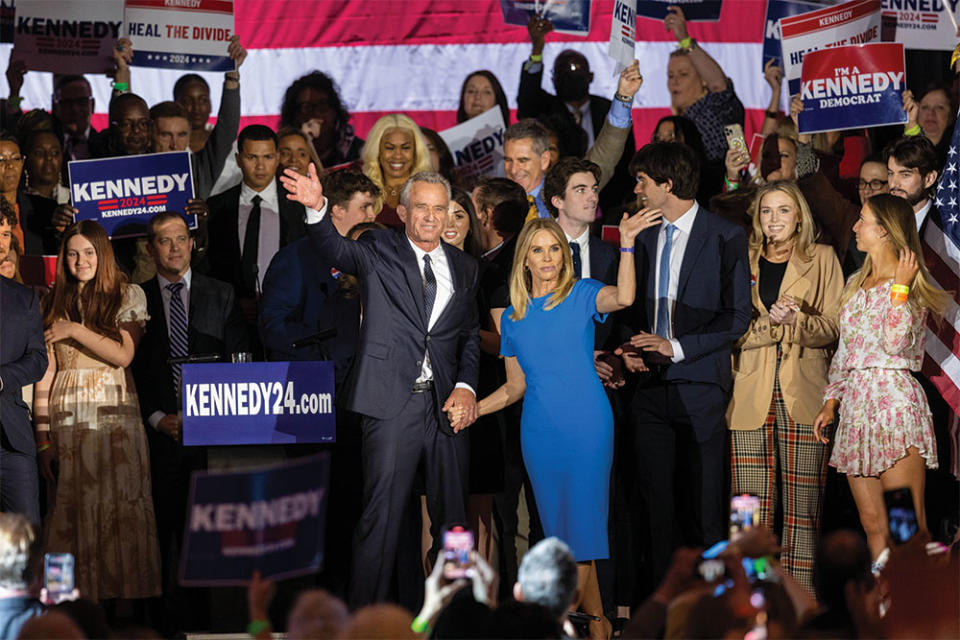
After multiple celebrities dropped out of that year’s ski fundraiser, Kennedy called Hines and asked whether she might fly up. When the two reconnected, they commiserated over the ends of their marriages, and “something clicked,” she says. “I saw him through different eyes. It was like, ‘Oh, you’re actually handsome.’ ” Says Kennedy: “As soon as I saw her, I was, like, smitten.”
Knowing David might disapprove of him dating his TV wife, Kennedy arranged a meeting with David in New York at the Carlyle Hotel. “I met him around 10 o’clock at night and asked him permission,” Kennedy recalls. “And he was amazing. He said he was so excited about it. And he said, ‘She’s the best person that I’ve ever met. She’s the only one in Hollywood who doesn’t have a single enemy.’ ” Later, Hines broached the topic with David. “And to her he went, ‘Ah, it’ll never work,’ ” Kennedy adds.
But the lukewarm Larry blessing had been bestowed. And thus began a bicoastal courtship, with Hines based in L.A. and Kennedy in New York, the two linking up every few months on a ski slope or a tropical island.
“I liked that when we got together, we were from two different worlds,” she says. “I liked that he wasn’t in the entertainment business. I liked that he was doing environmental law. And the Kennedy aspect? That didn’t seem to matter that much to me because he wasn’t in politics and his family was very warm and welcoming.”
That was then, of course. Kennedy since has entered politics in a big way. With his predilection for conspiracy theories and oft-clumsy manner at relaying them — at a January 2022 anti-vaccination rally in D.C., he infamously said, “Even in Hitler’s Germany, you could cross the Alps into Switzerland, you could hide in the attic like Anne Frank,” earning a rebuke from the Auschwitz Memorial — summer get-togethers at the family compound in Hyannis Port, Massachusetts, have grown chillier.
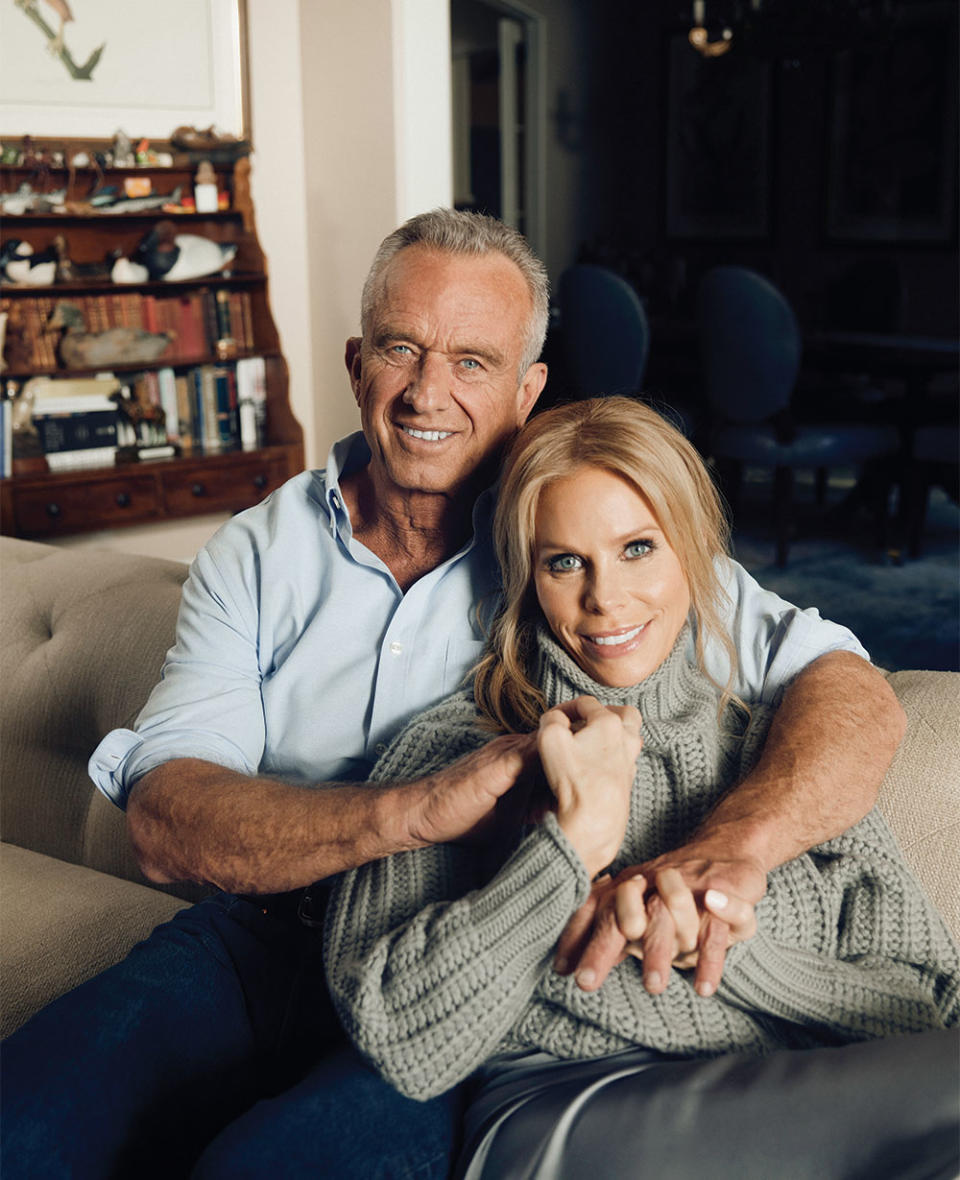
Four of his siblings (he is one of 11 children) — former Maryland Lt. Gov. Kathleen Kennedy Townsend, former Rep. Joseph Kennedy, Rory Kennedy and Kerry Kennedy — have collectively denounced his bid for the presidency, calling it “dangerous to our country. Bobby might share the same name as our father, but he does not share the same values, vision or judgment.” Meanwhile, Bobby’s cousin — JFK’s daughter and U.S. ambassador to Australia, Caroline Kennedy — has similarly gone public with her disapproval, as has her son, Jack Schlossberg, who posted a video calling the candidacy “an embarrassment.”
I ask Hines whether all the infighting has put an end to the family get-togethers.
“No, no,” she says. “It all continues.”
“It must make it awkward, though?”
“I think organically, because of what’s going on in our lives, it doesn’t always fit in with what’s always been going on in their lives. Right now, we are in a different orbit,” she says.
“Are there any hard feelings on Bobby’s part?” I ask.
“He has no hard feelings, which is admirable. Because he knows that at the end of the day, this is hard for them — for lots of reasons. They didn’t ask for it. But just by being related to him, they are involved. I think that’s challenging for people,” she says, referring to the other Kennedys, though she could just as easily be talking about herself.
“I see my family all the time,” Kennedy later tells me. “I just came back from 10 days of skiing with the whole family, with Cheryl there. I mean, listen, I grew up in a milieu where we were raised to argue passionately with each other and still love each other. I feel my family loves me. There’s 105 members of my family, and a lot of them are supporting my campaign strongly. And there’s a small number that has criticized me — and that’s OK.”
“Is it because they feel you pose a danger to Biden winning or because they don’t like what you’re saying?” I inquire.
“You can ask them,” he says. “My understanding is that they’re most worried that my running is going to make it more likely for President Trump to win.”
For Hines, life with Kennedy has been one of constant reassessment and readjustment — or, to put it in improv terms, an endless stream of “yes, and-ing” her husband’s eccentric world view.
“At what point in your relationship did you start thinking, ‘Bobby has some very radical or novel ideas?’ ” I ask.
“That’s a fair question,” she says. “I guess a few years into it.”
“Did it ever occur to you that your partner may have a predilection toward conspiracies?”
“No,” she replies. “That never occurred to me. At the same time, I often think about what his life has been like — to watch his uncle be assassinated and then watch his father be assassinated. I do find it mysterious and odd and all of it to be larger-than-life.
“But when people say that he believes in conspiracies,” she continues, “I mean, people do conspire to do bad things. Watching him in the courtroom for the Monsanto trial, where they were suing over Roundup weed killer causing cancer, you see the emails that people share, people inside Monsanto who knew this was happening. Is that a conspiracy? Yes. But when people say he’s a conspiracy theorist, I really don’t know what to make of that. I mean, what is a conspiracy theorist? I’m asking you.”
“I guess someone who gravitates to conspiratorial explanations of events, no matter how unlikely, as opposed to the more straightforward one — Occam’s razor, or whatever,” I respond.
“Right,” she says. “I would think that you would see the world through a different lens if you saw your uncle be assassinated, then your father.”
“Has Bobby reshaped your own thinking?” I ask.
“If you were an attorney, maybe you would see certain things before other people do. My mind might not go there. I don’t automatically think, ‘Oh, there’s poison in the baby food — people must have gotten together to do it.’ But there is poison in the baby food. There’s arsenic in the baby food.” (She is referring to studies that have found trace amounts of toxic metals in commercial baby food.) “So who knew about it and when did they know?”
Hines pauses. “So, yeah. I guess maybe I have changed,” she says. “Maybe I am like, ‘OK, what’s the rest of the story? What’s the whole story?’ ”
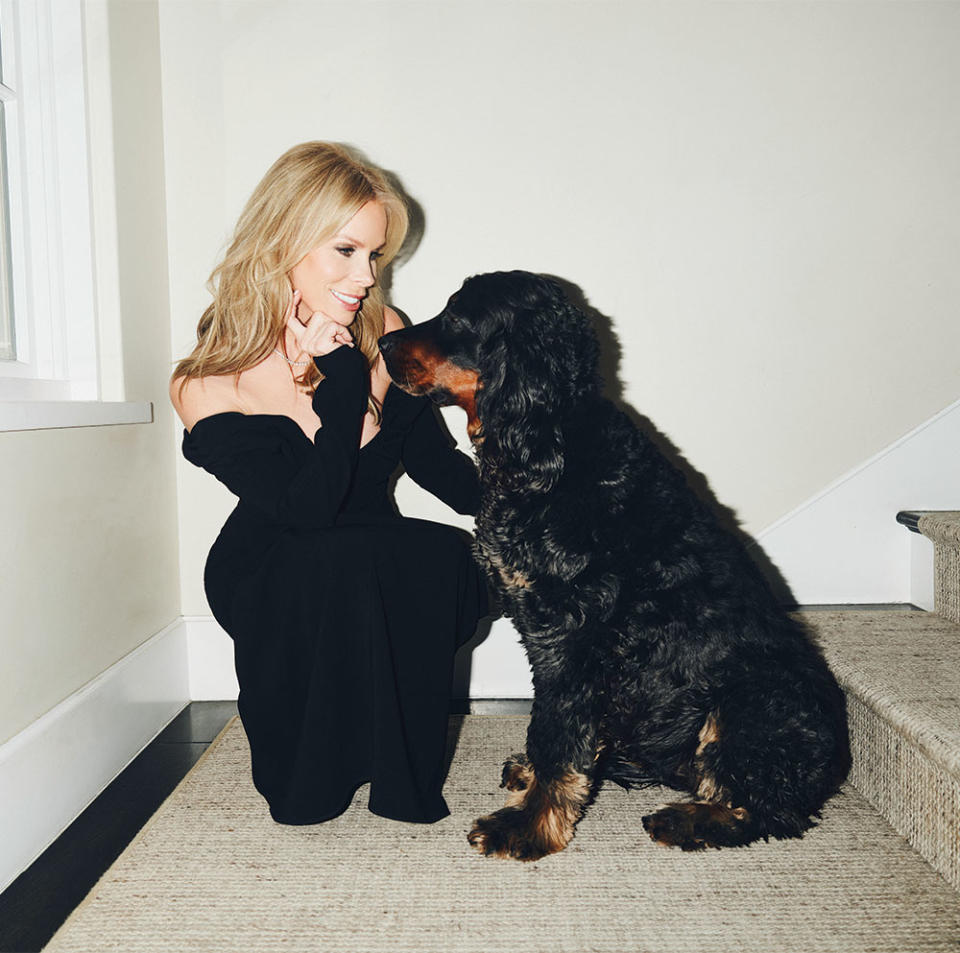
***
As supportive a wife as she is, Hines does occasionally draw lines in the sand. She confirms that she has forbidden her husband from communicating with far-right agitators Steve Bannon and Alex Jones. “Bobby will talk to anybody and wants to connect with everybody,” she says. “I understand where he is coming from. But I also have my limits.”
Hines also tweeted in response to her husband’s comments about Nazi Germany: “My husband’s reference to Anne Frank at a mandate rally in D.C. was reprehensible and insensitive. … His opinions are not a reflection of my own.”
Kennedy — whose voice is hampered by a condition called spasmodic dysphonia, giving the impression of a never-quite-cleared throat — responded defensively when asked by CNN whether Hines was right for tweeting that. “No, she’s not right,” he said. “But it was something that needed to be said at that time.”
Hines had warned her husband that she planned to put out a statement distancing herself from his remarks, which had stirred up a lot of outrage. “But I don’t think he knew how strong it was going to be,” she says. “I was angry. I was like, ‘Why would he need to use that reference to make his point?’ ”
The incident caused a period of friction at home. But tempers never flared. “Bobby has the most calm, accepting temperament of anyone I know,” she says. “I’ve only seen him get mad once, and that was only because someone was being mean to me. So no, he wasn’t mad at me. He understood I needed to express myself. I’m sure it was hard on him. If I had to do it all over again, would I use such strong words? Probably not.”
Kennedy maintains that his words had been taken out of context — he was referring to state surveillance, not COVID-19, when he made his Holocaust analogy — and says “the worst thing for me was that I was being deliberately misinterpreted in a way that was very hurtful to her and that people were coming after her. I am very conscious that Cheryl created her life out of talent and really hard work. And my job as her husband should have been to enhance all of the gifts she had gotten for herself. Instead, I was detracting value.”
His next major controversy came in July: In a leaked video taken at a New York media dinner, Kennedy can be heard saying, “COVID-19 attacks certain races disproportionately. … The people who are most immune are Ashkenazi Jews and Chinese.”
That time, Hines opted to say nothing. “I’ve learned a lot in the last two years,” she explains. “I pay less attention to social media. There’s a cycle to news. Things spike, they talk about it for one or two days, then they move on. And so I’ve learned to stay out of it because my words live on. And because Bobby’s my husband. And I would never want to hurt Bobby. I love him.”
The public scrutiny has taken its toll on her social life. And things never got more heated than at the height of the COVID-19 pandemic, when, as the better half to the country’s most visible vaccine skeptic — Kennedy authored the 2021 hatchet job The Real Anthony Fauci — she suddenly found herself a whipping post for both sides of the debate.
“It was very stressful for many reasons,” she recalls. “People were in one camp or the other, and that’s who they surrounded themselves with. And both sides were angry at the other side for not thinking the way they thought.”
“What side was Larry on?” I ask.
“I don’t want to speak for Larry, but I’ll make a generalization about this town,” she says. “I think a lot of people in this town were very passionate about getting a vaccine and about other people getting vaccinated.” Regarding her own COVID-19 vaccination status, Hines says, “I did what I needed to do to work. If I wasn’t working, would things be different? Maybe. I’m not the kind of person that gets the flu shot.” Her husband, “it’s safe to say, is not” vaccinated, she adds.
The tensions came to a head in December 2021, after an invitation to her Christmas party leaked to the press. “It had been a year of hot tempers,” she says. “I really wanted to have a party where people could come if they wanted to. I put on the invitation that you can be vaccinated. The part the press did not report is you could also attend if you tested negative for COVID. But whoever leaked this — and I feel like I have an idea who it was — didn’t leak that part. They just said that I insisted on everyone being vaccinated, which is ridiculous. I would never do that.”
The backlash was swift and harsh and came from seemingly every direction. Pro-vaxxers called her a hypocrite for standing by her husband while he espoused what they felt were dangerous views; anti-vaxxers labeled her a Judas to the movement he championed. Kennedy himself wasn’t quite sure how to navigate the controversy, telling a reporter at the time, “I guess I’m not always the boss at my own house.”
Hines says the chapter was a turning point, showing her “a side of some of my friends that surprised me. It brought out a dark side with some people. So some acquaintances sort of drifted. But my inner circle is still the same,” she notes.
Suzanne Todd, a movie producer who befriended Hines at a charity poker tournament 17 years ago, says: “I never really observed anyone in our small circle of close friends treating her differently, but this is Hollywood. Nobody needs a reason to behave badly toward other people.”
Even within her inner circle, however, there has been a concerted effort to persuade her husband to drop out of the race, according to a family friend who asked not to be identified. David, too, has distanced himself from the campaign, telling The New York Times, “I love and support [Bobby], but I’m not ‘supporting’ him.”

***
The last three third-party candidates to move the needle in any significant way — Jill Stein in 2016, Ralph Nader in 2000 and Ross Perot in 1992 — amassed a grand total of 0 electoral votes among them. That is to say, Cheryl Hines will in all likelihood not be the next first lady of the United States. But it isn’t to say Kennedy won’t affect the outcome. Current polling suggests he will siphon a number of votes away from the Democratic and Republican candidates — it’s just a question of whose votes he’ll siphon.
To dyed-in-the-wool Democrats like Hines’ former boss Reiner (who tweeted in July, “Bobby Kennedy Jr. is no John Kennedy”) and the rest of the Kennedy clan, any chance that Bobby could tip the scales in Donald Trump’s favor is a risk not worth taking. The converse argument is that Bobby’s paranoiac tendencies will appeal to the Deep State and QAnon crowds that previously favored Trump.
“If anyone is looking at polls, Trump is ahead without Bobby being involved,” Hines notes. “Bobby actually has a lot of Republican supporters. He has a lot of independent supporters and a lot of Democratic supporters. My opinion, just seeing what I see, is that Bobby is more likely to take votes from Trump than he is votes from Biden.”
Whatever the outcome, Hines says she has no intention of abandoning her television and film career. The family has been approached by documentary producers to turn the next 10 months into what indubitably would be a riveting look inside a political campaign, but that’s not the kind of project she’s interested in. (“I can’t imagine how stressful it would be to be miked all the time,” she says.) Since the strike ended, Hines has pushed herself back into circulation in Hollywood, attending the Jan. 6 Amazon MGM Studios and Vanity Fair awards season party at Bar Marmont. “We want to remind people that Cheryl is an actor and very funny and that part of her exists,” says her best friend Harris, who accompanied Hines to the event. “We ran into a million people. She was so well received. You can’t help it — she’s just love and light and really wants what’s best for everyone.”
And yet, it’s almost too tempting not to imagine — even for just a moment — Hines landing the role of her lifetime. Picture it: Curb Your Enthusiasm’s long-suffering spouse standing in the Rose Garden, her face frozen in a clenched smile as she processes whatever cringey comment her husband has just uttered to a visiting foreign dignitary. Cue the Curb music.
I ask Hines whether she wants to be the first lady.
“If you’re asking me, ‘Has this been my dream, to be first lady?’ I would say, ‘No.’ But if someone said to me: ‘Guess what? You’re going to be first lady tomorrow,’ I would say, ‘Great. Let’s do it. I can’t wait to see what this looks like.’ When I look at it like that, I think, ‘Wow, what an extraordinary situation.’ And if that’s what life hands you, then you accept it and experience it for everything it has to offer.”
“Just think of the trajectory,” I observe. “From the InterContinental bar to the White House.”
“I’ll be in the window, etching, ‘HELP ME,’ ” she says.
This story first appeared in the Jan. 18 issue of The Hollywood Reporter magazine. Click here to subscribe.
Best of The Hollywood Reporter

 Yahoo News
Yahoo News 
